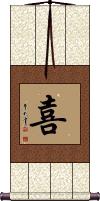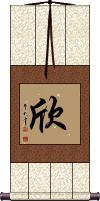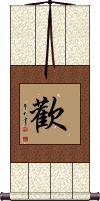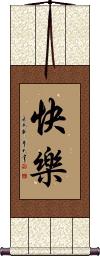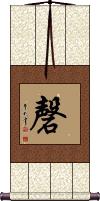Many custom options...
And formats...

Felicity in Chinese / Japanese...
Buy a Felicity calligraphy wall scroll here!
Personalize your custom “Felicity” project by clicking the button next to your favorite “Felicity” title below...
Happiness / Joyful / Joy
喜 is the Chinese, Japanese Kanji, and Korean Hanja for the kind of happiness known in the west as “joy.”
喜 can also be translated as rejoice, enjoyment, delighted, pleased, or “take pleasure in.” Sometimes it can mean “to be fond of” (in a certain context).
If you write two of these happiness/joy characters side by side, you create another character known in English as “double happiness,” which is a symbol associated with weddings and happy marriages.
There is another version of this character that you will find on our website with an additional radical on the left side (exactly same meaning, just an alternate form). The version of happiness shown here is the commonly written form in China, Japan and South Korea (banned in North Korea).
See Also: Contentment | Happiness | Joy
Happy
欣 is the type of happiness that you feel on the inside. It is the feeling of being released and delighted as well as being in a state of contentment. 欣 is more the internal happiness that perhaps only shows by the smile on your face. It can also be translated as “to take pleasure in” or “to rejoice.”
Note: 欣 is often used in compound words - especially in Korean Hanja.
As Japanese Kanji, this is so rare, that most Japanese people are not aware of its existence.
See Also: Happiness
Joyful
歡 means joyous, happy, delightful, and pleased.
歡 represents external happiness that may have you clapping and cheering.
Please note: The other happiness/joyful which looks like "喜" is more popular.
歡 is the ancient/old version in China and Japan. After WWII in Japan, they started using 歓. Just let us know if you want this modern version instead of the ancient one.
See Also: Happiness
Joyfulness / Happiness
快樂 or joyfulness is an inner sense of peace and happiness.
You appreciate the gifts each day brings. Without joyfulness, when the fun stops, our happiness stops. Joy can carry us through hard times even when we are feeling very sad.
快樂 can also mean pleasure, enjoyment, delight, cheerfulness, or merry. In some ways, this is the essence that makes someone perceived as a charming person.
See Also: Happiness
Khánh
磬 means “chime stones,” but I'm including it here for those looking for the original Chinese character for the Vietnamese name Khánh.
Other definitions include ancient percussion instrument made of stone or jade pieces hung in a row and struck as a xylophone, sounding stone, ancient Chinese chime shaped like a chevron.
There is also a possibility that your original character is 慶 which means to celebrate or felicity. Contact me if you need that character.
Not the results for felicity that you were looking for?
Below are some entries from our dictionary that may match your felicity search...
| Characters If shown, 2nd row is Simp. Chinese |
Pronunciation Romanization |
Simple Dictionary Definition |
福 see styles |
fú fu2 fu fuku ふく |
More info & calligraphy: Good Luck / Good Fortunegood fortune; happiness; blessing; good luck; (surname) Fukutsuru Blessing, happiness, felicity, good fortune. |
慶 庆 see styles |
qìng qing4 ch`ing ching yoshi よし |
to celebrate (female given name) Yoshi Felicity, felicitous, felicitate. |
滅 灭 see styles |
miè mie4 mieh metsu |
to extinguish or put out; to go out (of a fire etc); to exterminate or wipe out; to drown Extinguish, exterminate, destroy; a tr. of nirodha, suppression, annihilation; of nirvāṇa, blown out, extinguished, dead, perfect rest, highest felicity, etc.; and of nivṛtti, cessation, disappearance. nirodha is the third of the four axioms: 苦, 集, 滅, 道 pain, its focussing, its cessation (or cure), the way of such cure. Various ideas are expressed as to the meaning of 滅, i.e. annihilation or extinction of existence; or of rebirth and mortal existence; or of the passions as the cause of pain; and it is the two latter views which generally prevail; cf. M017574 10 strokes. |
祉 see styles |
zhǐ zhi3 chih minoru みのる |
felicity (given name) Minoru |
祺 see styles |
qí qi2 ch`i chi |
auspicious; propitious; good luck; felicity; euphoria; used for 旗, e.g. in 旗袍, long Chinese dress |
禠 see styles |
sī si1 ssu |
felicity; blessing |
三福 see styles |
sān fú san1 fu2 san fu mifuku みふく |
(place-name, surname) Mifuku The three (sources of) felicity: (1) The 無量壽經 has the felicity of (a) 世福 filial piety, regard for elders, keeping the ten commandments; (b) 戒福 of keeping the other commandments; (c) 行福 of resolve on complete bodhi and the pursuit of the Buddha-way. (2) The 倶舍論 18, has the blessedness of (a) 施類福 almsgiving, in evoking resultant wealth; (b) 戒類福 observance of the 性戒 (against killing, stealing, adultery, lying) and the 遮戒 (against alcohol, etc.), in obtaining a happy lot in the heavens; (c) 修類福 observance of meditation in obtaining final escape from the mortal round. Cf. 三種淨業. |
幸い see styles |
saiwai さいわい |
(noun or adjectival noun) (1) (See 幸いする・さいわいする) happiness; blessedness; luck; fortune; felicity; (adverb) (2) luckily; fortunately |
悉利 see styles |
xī lì xi1 li4 hsi li shiri |
idem 室利 q.v. 悉地 siddhi, accomplishment, complete attainment, perfection, proof, truth, final emancipation, supreme felicity, magical or supernatural powers; cf. M.W. As supernatural power it is used to end calamities, subdue demons, etc. |
福慶 福庆 see styles |
fú qìng fu2 qing4 fu ch`ing fu ching fukuyoshi ふくよし |
(surname) Fukuyoshi Blessedness and felicity, blessed felicity; to congratulate on good fortune. |
難陀 难陀 see styles |
nán tuó nan2 tuo2 nan t`o nan to Nanda |
難陁 nanda, "happiness, pleasure, joy, felicity." M.W. Name of disciples not easy to discriminate; one is called Cowherd Nanda, an arhat; another Sundarananda, to distinguish him from Ānanda, and the above; also, of a milkman who gave Śākyamuni milk; of a poor woman who could only offer a cash to buy oil for a lamp to Buddha; of a nāga king; etc. |
元吉樹 元吉树 see styles |
yuán jí shù yuan2 ji2 shu4 yüan chi shu gankitsuju |
The tree of the origin of felicity, i. e. the bodhi-tree or ficus religiosa, also styled 佛樹; 道樹, and 菩提樹. |
和伽羅 和伽罗 see styles |
hé qié luó he2 qie2 luo2 ho ch`ieh lo ho chieh lo wagara |
(和伽羅那); 和伽那; 和羅那 vyākaraṇa, grammar, analysis, change of form; intp. as 授記 prediction, i. e. by the Buddha of the future felicity and realm of a disciple, hence Kauṇḍinya is known as Vyākaraṇa-Kauṇḍinya. |
三品悉地 see styles |
sān pǐn xī dì san1 pin3 xi1 di4 san p`in hsi ti san pin hsi ti sanbon shitji |
The three esoteric kinds of siddhi, i.e. complete attainment, supreme felicity. They are 上 superior, to be born in the 密嚴國 Vairocana Pure-land; 中 in one of the other Pure-lands among which is the Western Paradise; and 下 in the 修羅宮 Sun Palaces among the devas. Also styled 三品成就. |
フェリシティ see styles |
ferishiti フェリシティ |
(female given name) Felicity |
フェリシティー see styles |
ferishitii / ferishiti フェリシティー |
(female given name) Felicity |
The following table may be helpful for those studying Chinese or Japanese...
| Title | Characters | Romaji (Romanized Japanese) | Various forms of Romanized Chinese | |
| Happiness Joyful Joy | 喜 | ki / yorokobi | xǐ / xi3 / xi | hsi |
| Happy | 欣 | kin | xīn / xin1 / xin | hsin |
| Joyful | 歡 欢 / 歓 | kan | huān / huan1 / huan | |
| Joyfulness Happiness | 快樂 快乐 | kai raku / kairaku | kuài lè / kuai4 le4 / kuai le / kuaile | k`uai le / kuaile / kuai le |
| Khánh | 磬 | kei / ke | qìng / qing4 / qing | ch`ing / ching |
| In some entries above you will see that characters have different versions above and below a line. In these cases, the characters above the line are Traditional Chinese, while the ones below are Simplified Chinese. | ||||
Successful Chinese Character and Japanese Kanji calligraphy searches within the last few hours...
